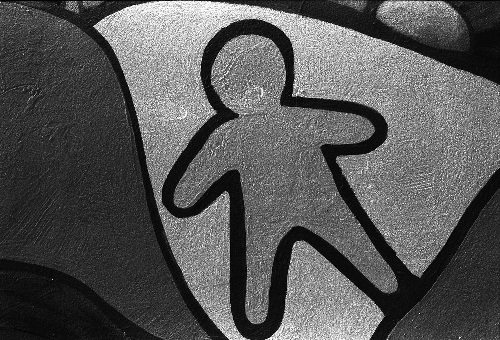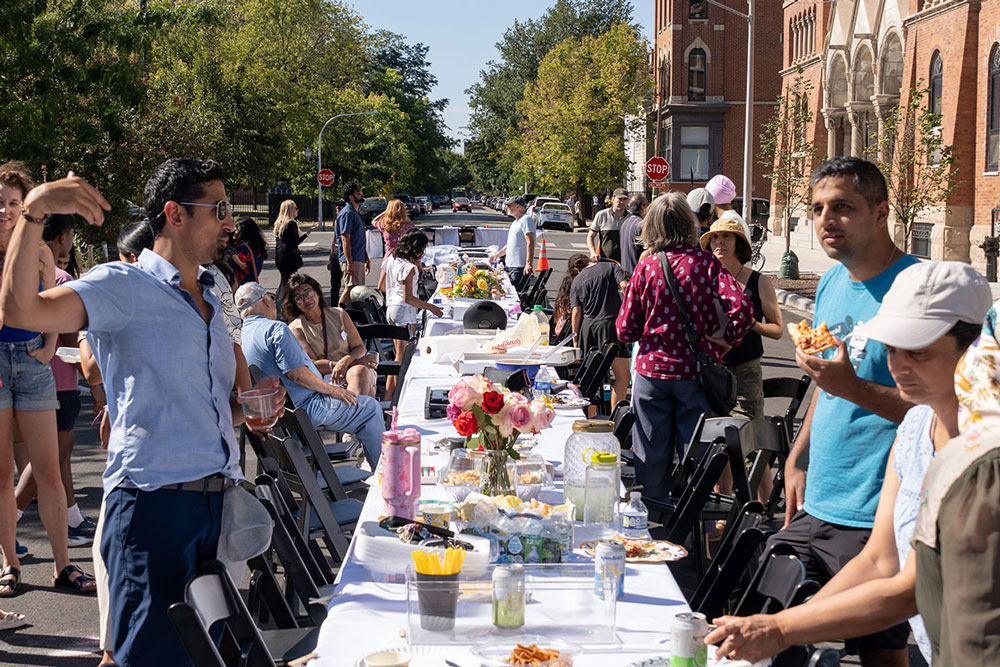
The following was delivered at a joint meeting of NPQ friend David Renz’s Midwest Center for Nonprofit Leadership at UMKC and Nonprofit Missouri.
Like many of you in this room today, I suspect, I’ve recently been through the process of caring for an elderly parent—namely, my mother. She was born a bit north of here in Cainsville, Missouri, in 1911. She was buried just shy of one hundred years later, on a frigid January day in central Michigan, in 2011.
Caring for her was a process that seemed endless at the time, until one day, it was suddenly over. And now, what I wouldn’t give to have just one more hour with her, watching Judge Judy on late afternoon TV and scheming to be first in line for the evening meal, even if that meant going down to the dining room 30 minutes early.
Now, by “caring” for her, I certainly don’t mean that I cooked her meals, did her laundry, or tended to her ever-expanding list of health needs. Those tasks were performed by a vast array of service providers: her assisted care facility, her home health care provider, her gerontologist, her pharmacist.
Indeed, in one of the wonders of modern American social organization, my mother came under the care of many professions that were unimaginable when she was a child. Each of those professions is rooted in some fairly new development in the medical or social sciences. Each typically requires university education or some form of advanced training, an examination or period of testing, official certification to practice, and membership in a national organization formed to promote the interests of the profession.
Ideally, each of these systems of service delivers the appropriate unit of care in a precisely measured and economically priced dosage at exactly the right moment.
Ideally, each service enters and exits the client’s life in a flawlessly choreographed waltz of the professionals.
Ideally.
In the real world, the world where you and I live and work, it doesn’t happen that way.
I’m sure many of you have had the experience I had late one afternoon, after a hasty flight back to Michigan to bring my mother home from one of her hospitalizations. As was always the case, she was clutching a substantial list of adjustments in medication that her doctors wanted her to try out. The pharmaceuticals we now have to temper the effects of aging are surely among the great scientific advances of our time.
But just as surely, Mom was in no position to understand or pursue these newest adjustments on her own. Mom’s residential care facility, as wonderful as it was, legally could not become involved in her medication. Even her home health aide, whom I assumed we were paying to handle precisely such situations, was likewise forbidden by regulations to deal with the pharmacy or touch the medication, though helpfully she could watch Mom take the pills, and even go so far as to remind her to do so.
An additional inflexibility: These newest drug adjustments came just after the pharmacy had persuaded us to go to “bubble packs” for her medication, since the tiny boxes of her pill organizer had begun mysteriously to yield a surplus at the end of each period.
The upshot, of course, is that at the very epicenter of so many advanced professions focusing on my mother’s health and welfare—and not out of charity, I might add—there seemed to be no one but me available to return the bubble packs to the pharmacy, wait for them to be reassembled with the new prescriptions, and then take them back to my mother.
Problem solved…that is, until the next medical emergency, the next frantic flight back from Washington, the next pharmaceutical amendments.
Now, I’m sure some of you react to this self-pitying anecdote the way my wife Sharon did—namely, “Welcome to my world, Scooter, and by the way, you got off easy.” An ever greater number of her waking hours are now occupied with caring for her aging mother—researching, contacting, scheduling, marshaling, prioritizing, juggling, coordinating and shuttling to and fro among the growing fleet of professional service providers required to keep her mother going, along with the reams and reams of paperwork generated by a complex system of payment providers.
This is not a phenomenon solely of the world of aging, of course. Parents today have a similarly lengthy roll of service providers crowding around the lives of their children, providing socialization, sports training, enhanced educational opportunities, college preparation and, after all this, occasionally, therapy and rehabilitation. Caregivers for anyone with a physical or mental disease or disability can provide a similarly elaborate litany of specialized providers.
One by one, service providers make excellent arguments for their active presence in our lives. They have acquired expertise—they have worked very hard toward advanced training and certification—in the development of certain capacities that we seem to need, especially by their own not entirely objective accounts. And by specializing, by focusing just on the skills of this one discipline and organizing accordingly, they plausibly argue that they are providing services in the most efficient and cost-effective way possible, as demonstrated by the readily measurable outcomes of their concentrated and sustained efforts.
At any rate, we ourselves are active participants in this system—many of us make our livings by delivering specialized goods and services within carefully defined professional contexts. Even if we wanted to substitute our own bumbling and amateurish versions of assistance to those for whom we care, we simply don’t have enough time or energy to do it.
All of this is possibly true. But don’t we pay a price for it, all the same?
When we divide and subdivide ourselves and the persons in our care into countless small, professionally digestible, efficiently deliverable dosages of service, aren’t we in danger of losing sight of the “whole person?”
The difficulty is that each of us is somehow more than the sum of our serviceable parts, for which a steady stream of identical, assembly-line responses might be adequate.
To flirt with banality, each of us is a whole person in a unique way.
Each of us is a peculiar and idiosyncratic combination of character traits, of virtues and vices, quirks and foibles, strengths and weaknesses, tics and gestures both annoying and adorable, which make us distinctly who we are. No professional service, and no easily arranged alignment of services, can readily address our particular constellation of traits.
Sign up for our free newsletters
Subscribe to NPQ's newsletters to have our top stories delivered directly to your inbox.
By signing up, you agree to our privacy policy and terms of use, and to receive messages from NPQ and our partners.
The frantic juggling act by which we try to hold the stream of services together around just one person like my mother is simply an outward sign of this larger complexity, for which professionalism itself has no response—although it tries. Care coordination meetings, one-stop social service centers, block grants, collaborative coalitions…all these are clumsy institutional devices to try to put back together the person previously subdivided into serviceable parts. But sooner or later, the systems show up with these problems on the doorstep of the nonprofit sector—on your doorstep.
As the scholarly literature reminds us, the services and their funders approach and contract out to the nonprofit sector because they realize that they have achieved focus and efficiency only at the cost of flexibility and responsiveness. But these latter qualities are demanded precisely because people and their needs are all quite different, demanding more than identical packages of services. And nonprofits—operating close to the ground, cognizant of and responsive to the idiosyncrasies of the individuals and the communities they serve—promise to balance sterile efficiency with individualized, flexible attention.
If we turn for a moment to Alexis de Tocqueville—you must understand that I would forfeit my membership in the conservative movement if I didn’t somehow bring Tocqueville into this discussion—we find a deeply thoughtful description of the role the nonprofit sector, or civil associations, must play in developing the whole person. (Although precisely the same message may be found in more contemporary writers like Wendell Berry, John McKnight, Paolo Freire, Ivan Illich, Charles Taylor,Jane Jacobs, Richard Rohr, Susan Pinker, Harry Boyte, and Bob Woodson.)
Tocqueville warned us that in our democratic age, the old social ties that once bound us together and helped us develop into more complete, public-spirited, and compassionate human beings were going to be severely eroded by the forces of materialism and individualism. However liberating and enriching these forces might seem, they also paved the way for us to retreat into an ever-shrinking sphere of private life, where we would become truncated and incomplete, mere producers and consumers of goods and services.
Tocqueville would apprehend this danger in today’s organization of life into ever-narrowing professional silos. As he put it, this age will throw the democratic citizen “back forever upon himself alone, and threatens in the end to confine him entirely within the solitude of his own heart.”
Americans, however, had found a way to combat the radically isolating effects of individualism, through a well-developed civil society. Active local civic associations draw people out of isolation, into public life.
We typically and off-handedly celebrate civil society today for its role in democratic engagement. But more profoundly, in Tocqueville’s view, it’s essential for the development of the whole person that we’ve been discussing. In his words, “Sentiments and ideas renew themselves, the heart is enlarged, and the human mind is developed only by the reciprocal action of [people] upon one another.”
Acting together within civic associations, through all our fussing and fighting, our arguing and deliberating, we learn more and more about each other, and about ourselves. We may do so at first merely out of manipulative selfishness. But over time, Tocqueville suggested, we do so out of habit, and ultimately, even out of appreciation and love for our common humanity. We develop into the full and complex human beings we are meant to be only through immediate, face-to-face interaction with and recognition of other complex human beings.
When the professional services come to the nonprofit sector and seek out its responsiveness and flexibility, they implicitly acknowledge the insufficiency and sterility of their own approach to human beings as mere bundles of needs to be serviced uniformly and efficiently. Services provided through nonprofits, it is hoped, will somehow combine professionalism and efficiency with individualized attention to the whole, unique person emerging from civic association.
How is that effort at combination coming along today? Were Tocqueville here to comment, I suspect he would advise us to be wary. He would be deeply concerned about the trends that you all face today.
Ironically, the very qualities that professional services seek within nonprofits are the qualities that tend to be suppressed over time by the imperialistic demands of professionalism. For those demands are remorseless. Any nonprofit recruited to be the vehicle of service delivery, no matter how much latitude the initial contract affords, inevitably faces more and more regulatory constraint. Even when individual attentiveness and discretion are exercised responsibly, sooner or later, different treatment of different people comes to appear as unjust preference for some over others. The demand for clear and measurable efficiency in an age of shrinking resources can only curtail the time and attention required to attend to persons in their wholeness and complexity. The lure of resources which become available only by focusing narrowly on currently fashionable causes makes the generalized community-mindedness of a nonprofit seem more like mission drift than responsiveness.
In spite of this, I know that few of you have the luxury of resisting the trend toward professionalization, because that would literally cost you. But I would urge you to do this: remember that at the heart of your nonprofit, and of any civic association, is precisely the concern for and attention to the whole person, rather than the person as a sum of serviceable needs. Your funders, public and private, probably came to you in the first place precisely because you reflected this belief. And it is still true even as they now impose constraints that make its fulfillment ever more difficult.
I know that many of you work hard to find ways around these constraints. You do what you know in your heart is the right thing in any given circumstance for any given, unique individual, in spite of frustrating contractual impediments. You or your employees spend a full hour with someone in your care, rather than the budgeted fifteen minutes. You find a way to help someone make this month’s rent, even if it that renegade expenditure must be surreptitiously slipped out of the development budget. You actually hand someone her medication, even if the rules forbid it.
As this list suggests, you may be called to engage in subversive acts, in subtle gestures of insubordination, against the rules that compel you treat someone as a mere consumer of narrowly tailored services rather than as a whole person. Sadly, this all too often only calls down ever more restrictive regulations and oversight, because our professional systems find it so hard to distinguish between abuse and adaptation. But sometimes, within the systems themselves, you find fellow co-conspirators who recognize the absurdity of their own rules and will quietly bend them for you accordingly.
I urge you to continue your acts of subversion. And I urge you to do so not with a guilty conscience, but rather with the awareness that American civil society performs its highest duty when it draws out the whole person through the “reciprocal action” of people upon one another. And be aware that sometimes more than subversion is called for, but rather outright rebellion. That moment arrives when the established service providers seem to neglect altogether some marginal population in need.
A vigorous civil society provides the cradle of rebellion.
Two examples, one religious and one secular:
When neither the Church of England nor its populist offshoot Methodism seemed interested in extended its ministrations to the gin-soaked, poverty-stricken lanes of London’s East End, William Booth rebelled against the cold-heartedness and went among the poor with his brash, disruptive Salvation Army. Enduring abuse from riotous mobs, alarmed pub-owners and even the police, Booth persevered. Today, the Salvation Army is among the top five largest American nonprofits by revenue, and does a notable job of reconciling the demands of professionalism with the need to develop the whole person.
Similarly, until the 1970s, neither established service providers nor the criminal justice system seemed capable of understanding the needs of battered women. In a brazen act of rebellion, a brave band of pioneering women launched their own civic movement to meet this challenge, through carefully concealed domestic violence shelters where the larger needs of battered women were taken seriously.
Perhaps a similar rebellion will arise among today’s elderly, as they discover deficiencies and neglect among the services directed toward them. Certainly, the dissolution of the whole person into a bundle of needs is particularly tragic when it comes to the elderly. A person tends to become a richer whole—“holier,” so to speak—over time, to recognize and bring out the previously hidden parts of herself, and to help others through “reciprocal action” to bring out their own hidden parts as well. As people grow into and embrace their own complexity, a quality arises that we once recognized as wisdom. But we as a society today fail to seek out the wisdom of the elderly, because we are too busy servicing them with ever more fracturing and simplifying professional ministrations.
We are too busy haggling with the pharmacy about updating bubble packs to sit quietly with a wise senior person, permitting ourselves to be drawn out of our own simplified and sterile professional niches into a larger and truer self.
Many of us in the nonprofit sector, however, find ourselves among such sources of wisdom every day, if only we can put aside our own proud but partial professional knowledge long enough to seek them out. Work done well in the nonprofit sector—that is, according to its genuine civic calling—ultimately helps us become whole persons as well.











